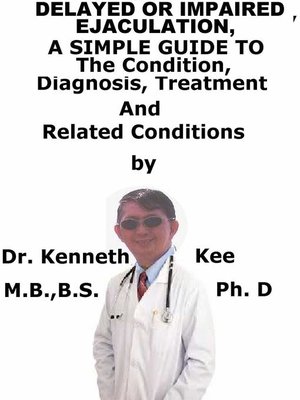Delayed or Impaired Ejaculation, a Simple Guide to the Condition, Diagnosis, Treatment and Related Conditions
ebook
By Kenneth Kee

Sign up to save your library
With an OverDrive account, you can save your favorite libraries for at-a-glance information about availability. Find out more about OverDrive accounts.
Find this title in Libby, the library reading app by OverDrive.



Search for a digital library with this title
Title found at these libraries:
| Loading... |
Delayed or impaired ejaculation is a medical disorder in which a male cannot ejaculate.
This is the opposite of premature ejaculation, and occurs when orgasm and ejaculation takes too long to reach.
This can happen occasionally to any man, but when it happens too frequently then it may be a problem.
It may happen either during intercourse or by manual stimulation by a partner.
Ejaculation is when semen is released from the penis.
The man does not need to achieve orgasm every time for the sexual intercourse to be pleasurable and pleasant.
His sexual partner may also become not comfortable or feel discomfort with prolonged thrusting.
Men with delayed ejaculation may be unable to ejaculate or may only be able to ejaculate with strenuous effort after having intercourse for a long time (for example, 30 to 45 minutes).
Delayed ejaculation may have psychological or physical causes.
Frequent psychological causes are:
1. Religious background that makes the person view sex as sinful
2. Lack of attraction for a partner
3. Conditioning caused by a habit of excessive masturbation
4. Traumatic events (such as being found masturbating or having illegal sex, or learning one's partner is having an affair)
5. Some factors, such as anger toward the partner, may be involved.
Physical causes are:
1. Blockage of the ducts that semen passes through
2. Use of certain drugs (such as prozac, mellaril, and guanethidine)
3. Nervous system diseases, such as stroke or nerve damage to the spinal cord or back
4. Testosterone deficiency
5. Nerve damage during surgery in the pelvis
The diagnosis of Delayed Ejaculation may involve the effects of prescribed medications:
1. Alpha-adrenergic blockers
2. Combined alpha- and beta-adrenergic blockers
3. Sympathetic nerve blockers
4. Anti-ulcer medications
5. Tricyclic antidepressants
6. Monoamine oxidase inhibitors
7. Selective serotonin reuptake inhibitors
8. Other antidepressants
9. Neuroleptics
10. Mood stabilizers
Microscopic examination of the bladder urine after a dry ejaculation is informative in distinguishing between retrograde ejaculation and emission failure.
When medicinal treatment for delayed ejaculation is under being determined, it is essential to exclude iatrogenic causes, such as medicines
Medicines that have been used are:
1. Alpha sympathomimetics (e.g., ephedrine or a combination of phenylpropanolamine hydrochloride and chlorpheniramine maleate)
2. Sildenafil
3. Imipramine
Any psychological intervention must treat both historical factors and current factors that might contribute to the present dysfunction.
TABLE OF CONTENT
Introduction
Chapter 1 Delayed Ejaculation
Chapter 2 Causes
Chapter 3 Symptoms
Chapter 4 Diagnosis
Chapter 5 Treatment
Chapter 6 Prognosis
Chapter 7 Male Orgasm
Chapter 8 Sexual Intercourse
Epilogue






